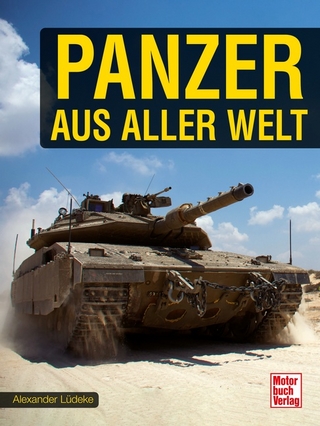
Panzer III
Seiten
2022
Osprey Publishing (Verlag)
978-1-4728-4587-0 (ISBN)
Osprey Publishing (Verlag)
978-1-4728-4587-0 (ISBN)
This highly illustrated title details the history of the Panzer III throughout World War II, from its early development in the pre-war years, through its pivotal role in the Blitzkrieg campaigns in Poland and Western Europe, to its eventual obsolescence on the Eastern Front.
The Panzer III was the mainstay of the German armoured forces in the early years of World War II and spearheaded the victories in Poland, Western Europe and the Balkans. Designed and developed in the mid-1930s, it was originally equipped with a 3.7cm gun and with 30mm-thick armour.
Early combat in Poland and France saw the need for this to be upgraded, and later models were armed with a 5cm KwK L/42 gun and had the frontal armour reinforced to 60mm by adding extra plating. This later version proved to be particularly effective during the campaigns in the Balkans and against British armour in the North African desert campaign.
However, in the first months of Operation Barbarossa – the German invasion of the Soviet Union – it became obvious to battlefield commanders that the Panzer III had become obsolete as a main battle tank and it began to be replaced by the Panzer IV as the main front-line battle tank.
The Panzer III was relegated to a secondary role, but its chassis proved the basis for the Sturmgeschutz III, which became the most widespread German armoured vehicle of World War II.
The Panzer III was the mainstay of the German armoured forces in the early years of World War II and spearheaded the victories in Poland, Western Europe and the Balkans. Designed and developed in the mid-1930s, it was originally equipped with a 3.7cm gun and with 30mm-thick armour.
Early combat in Poland and France saw the need for this to be upgraded, and later models were armed with a 5cm KwK L/42 gun and had the frontal armour reinforced to 60mm by adding extra plating. This later version proved to be particularly effective during the campaigns in the Balkans and against British armour in the North African desert campaign.
However, in the first months of Operation Barbarossa – the German invasion of the Soviet Union – it became obvious to battlefield commanders that the Panzer III had become obsolete as a main battle tank and it began to be replaced by the Panzer IV as the main front-line battle tank.
The Panzer III was relegated to a secondary role, but its chassis proved the basis for the Sturmgeschutz III, which became the most widespread German armoured vehicle of World War II.
Thomas Anderson is a specialist on German armoured fighting vehicles of World War II, and his other titles for Osprey include Panzer IV and Sturmgeschütz. He regularly contributes to popular modelling and historical magazines, including Military Modelcraft International (UK), Steel Art (Italy), Historia Militar (Spain) and Batailles & Blindes (France). He lives in Germany.
Blitzkrieg Panzer
1. Development
2. Production Begins
3. Combat in Poland
4. Combat in France
5. Further Development
6. The Balkan Invasion
7. North Africa
8. The Invasion of Russia
9. Progress
10: In Africa
11. Russia–1942/43
12. Support Vehicles
Index
Acknowledgements
| Erscheinungsdatum | 18.02.2022 |
|---|---|
| Zusatzinfo | Fully illustrated throughout in b&w |
| Sprache | englisch |
| Maße | 190 x 242 mm |
| Gewicht | 1272 g |
| Themenwelt | Natur / Technik ► Fahrzeuge / Flugzeuge / Schiffe ► Militärfahrzeuge / -flugzeuge / -schiffe |
| Geschichte ► Allgemeine Geschichte ► 1918 bis 1945 | |
| Geschichte ► Teilgebiete der Geschichte ► Militärgeschichte | |
| Sozialwissenschaften ► Politik / Verwaltung | |
| Technik | |
| ISBN-10 | 1-4728-4587-0 / 1472845870 |
| ISBN-13 | 978-1-4728-4587-0 / 9781472845870 |
| Zustand | Neuware |
| Haben Sie eine Frage zum Produkt? |
Mehr entdecken
aus dem Bereich
aus dem Bereich
von der Machtergreifung bis zur Gründung der Vereinten Nationen
Buch | Softcover (2023)
Motorbuch Verlag
CHF 38,90


